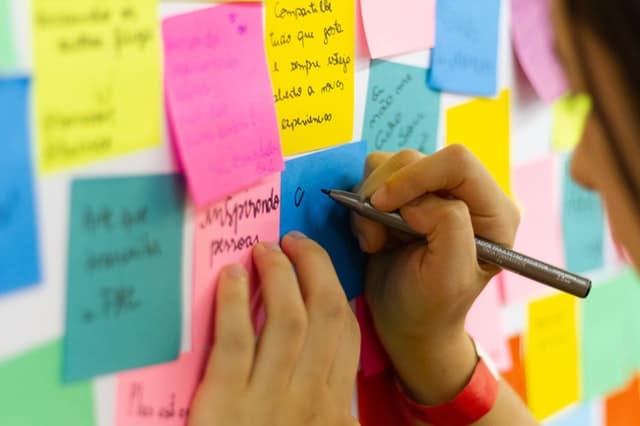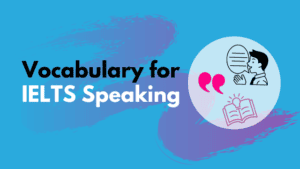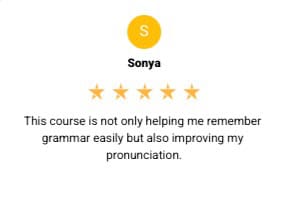7 Smart Ways to Think in English
👇 Take this lesson with you! 👇
Thinking in English
When you can think in English, you can process language more quickly and participate in conversations more easily.
However, this is not easy because many students across the world are taught English at school with grammar-translation methods.
It seems logical to learn a language, especially at beginner levels, by translating.
Unfortunately, this creates a habit that later is hard to break. However, it is essential you learn to break this habit, if you want to start thinking in English, speak fluently and answer questions quickly in the IELTS Speaking test.
Here we are going to look at 7 smart things you can start doing today, to start thinking in English.
Table of Contents
Surround yourself with English
I would say the first step to thinking in English is to surround yourself with English.
This doesn’t have to mean living in an English speaking country, although that is great if you can.
You can do it by giving yourself time everyday, where you only hear and see English. You can start with 10 minutes everyday, and then move up to 30 minutes, an hour or more; whatever you can manage.
See this as fun and enjoyable, not study. So I’m talking about doing the following in English:
- Listening to a podcast
- Listening to the Internet radio
- Listen to some songs
- Reading a book or magazine
- Reading a blog post or website you like (maybe connected with a hobby you have)
- Watching a YouTube video
- Watching a film or TV series
As you do this, you can do any or some of the following
- Passively listen
- Repeat words you hear/see
- Repeat phrases you hear/see
Why this is important.
Passive listening takes away any stress and helps you absorb the language better. Repeating words and phrases, gets you to activate new vocabulary so you can start using it fluently.
By only seeing and hearing English, you start to move away from translation to thinking in English.
Only use words you know
When speaking in English, sometimes students want to express an idea, but lack the vocabulary. So they go and look it up in a dictionary.
This is one way to build vocabulary, but it does not build fluency.
A great way to improve fluency and to start thinking in English is to only use words you know when speaking.
I know, this sounds strange to you, and you might think…
That’s too simple!
It is simple, and that is the beauty of it!
By not having to struggle with new words or looking for translations, you can focus just on fluency. Also because you are using words you already know, you never need to translate. You just practice using the words you know in sentences and conversations.
When you come across an idea you want to express, but you lack the words, you must find a way round it, just using the words you know – or give up the idea and say something else.

Start small and build up
A common technique to start thinking in English is to see an object and say the word to yourself in English.
You see this picture above and you say to yourself the words that you see and know. For example,
- Yoga
- Plants
- T-shirt
- Lights
- Mat
Again, don’t start looking up new words, just say (in your head) the words you know.
You can do this whenever you have a minute or two of ‘dead time’ (e.g. waiting in line, commuting on the train).
Instead of having a picture, you just look around yourself and say (in your head) what you see.
The first secret is to build the daily habit – even one minute a day is enough, to start.
The second secret is to start small and build up – following this order
- words
- collocations
- phrases
So, start with words, as in the example above.
Then use collocations (two or more words that commonly go together). For example, with my picture above,
- Yoga mat
- Blue T-shirt
- Indoor plants
- Bright lights
Then move to short phrases, for example,
- There’s a yoga mat
- She’s wearing a blue T-shirt
- The indoor plants are nice
Remember, keep it simple, and only use words you already know, as you start small (with words) and build up (to phrases).
Talk to yourself
In the exercise above you have been saying words in your head, and now in addition to that you need to start actually saying words out loud.
Again, the goal is not to build vocabulary, it’s to start building the habit of thinking in English.
The Russian psychologist Lev Vygotsky suggested that ‘inner speech’ (thinking) comes from the internalisation of your real voice (speaking).
Now, it is not very natural to describe what you see out loud (we only really do that in classrooms!), so more realistic and meaningful activities could be, for example,
Saying your feeling and reactions to different situations.
Such as saying, “That’s a silly hat”, when you see your neighbour in the street
Describing your plan for the day
Describing an activity you are doing
When cooking, “I need two eggs, where are they? here they are, now I put in some milk…..”
Reviewing what you have done today

Write in english
When it comes to thinking in English, I think the active skill of writing complements the active skill of talking (even to yourself), in creating an English environment that will help you think in English.
Of course, the way we speak and write are quite different, and I Do NOT encourage you to speak like you write, but there is some research suggesting speaking and writing are connected and can influence each other.
Personally, I have found writing words, especially in Chinese, helps me enormously to think and use that word, by adding a visual element to the audio (sound) I have in my head.
Here are some simple things you can start writing,
- shopping lists
- messages to family
- post it’s to yourself
- a diary
- a blog
When you do the above, you are first thinking, then reenforcing the learning and use of the language by writing it down. This in turn helps you think more in English.
Practice with others
In English we say,
‘The proof is in the pudding‘
This means, only when you do something, can you see if it really works.
So, whilst it is good to practice thinking when alone, you also need to practice it in conversation with others.
The more you engage in conversations in English, with students, teachers, or friends, the more you will have the chance to practice thinking in English as you speak.
Have some conversations where you just focus on thinking in English. In those cases, follow the tip above about only using words you know – Keep It Simple!
Be monolingual
Finally, one of the biggest changes I made in learning to think in a foreign language (especially when I was learning French and Spanish) was to switch from using a bilingual dictionary (French – English) to a monolingual one (French – French).
This was a critical step, because it forced me to stop translating and encouraged me to think in French. Yes, it was difficult and it took more time to use, but when I started to notice the benefits, I carried on using it.
Another expression we have in English is
‘There is no such thing as a free lunch’
This means you have to pay to get some benefit.
You cannot just start thinking in English overnight, it is not a magical transformation. It takes time and effort, like using the monolingual dictionary, and above all it takes practice.
However, the rewards are huge.
So start trying some of the steps above and see the change start to happen.
Let me know in the comments below your experience with thinking in English!
Improve your Speaking Skills with this Free Course
Crack IELTS Speaking Part 1
Learn to Speak with Confidence in Part 1 of Your IELTS Test!
⭐️⭐️⭐️⭐️⭐️
‘It’s such a great course. I’ve learned so many usages for speaking part 1.’
Zu Htet






11 thoughts on “7 Smart Ways to Think in English”
I’m afraid I beg to differ. In English we do not say, “The proof is in the pudding.” We say, “The proof of the pudding is in the eating.” Apart from that, however, some excellent suggestions. Thank you.
An ESOL teacher (retired)
Thanks for this Margaret, and glad you like the suggestions. Your comment got me thinking, because as kids growing up in Manchester, we would always say ‘the proof is in the pudding’. So I was thinking maybe it is a regional thing. You are right that the expression is also ‘The proof of the pudding is in the eating’ and that is how Cambridge dictionary says it. However, I have also seen the version I use in Merriam-webster dictionary and BBC learning English. Maybe it’s also down to spoken versions of the saying that change over time. Certainly food for thought!
These tiolps are so critical for who want learn another language. It was very helpful for me.
Thanks a lot
Glad you found them useful!
Hi. the 7 ways are so important. I have been practicing them for about 1 month.
thanks
Brilliant – great to hear that!
Hi
Tkanks a lot. It’s very important and effective.
I do its.
Glad it can help!
Hello,loving your courses!How to improve my readingcomprehension?If there are some tips?
Thanks Mark, please you like the courses. For reading, mix easy reading and complex reading. So make sure you read some passages that are below your level, and this will help you build fluency or speed of reading, and then also read texts that are slightly above your level to challenge you. Overall, don’t look up too many words when reading, focus on overall comprehension. Finally, focus on phrases rather than words. Good luck.
Pingback: 7 Smart Ways to Think in English - ielts source